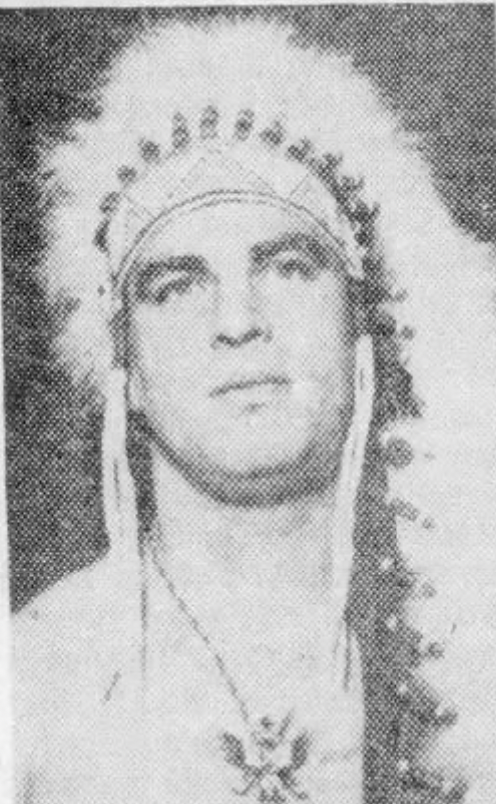The Opening Bell
Richard Thomas Bryant wasn’t a man who stumbled into wrestling—he was the kind of guy born for the road, the ring, and the roar. Born on March 21, 1935, he came up in the swamp heat, where the air hangs heavy and the mosquitos are meaner than some men you meet in a bar after midnight. A Seminole kid, quick on his feet and mean with a ball in his hands or a bat over his shoulder. Football, baseball, track—it didn’t matter. He could run you down, knock you over, or outrun you, depending on the mood and the game.
Five-foot-nine, 208 pounds of muscle that looked like it was carved out of cypress wood and sweat. He took his game to the University of Florida, putting on the pads for the Gators, but there was something else simmering under the helmet—an edge that didn’t quite fit into the neat rows of college athletics.
It was his wrestling—real wrestling, not the bright lights stuff yet—that caught the eye of Cowboy Luttrall, a Tampa promoter who’d seen enough barroom brawls and busted noses to spot a natural when one walked in. Luttrall didn’t give speeches. He just told him straight: “Kid, you should take a fling at the pro game.”
And just like that, the swamps had given up another fighter to the road—one more body to be slammed on the canvas under the smell of popcorn, beer, and blood. He started as plain ol’ Dick Bryant before morphing into Chief Little Eagle.
This was the ’50s and ’60s wrestling scene—Georgia, Dallas, Tri-State—territories where the pay was light, the rings were hard, and the crowds had more cigarette smoke than oxygen. You earned your keep by fighting three, four nights a week. Bryant did more than that—he became a tag-team terror alongside Chief Big Heart, a duo built like a whiskey-and-gunpowder handshake.

Tag Team Glory in the South
In April 1959, the Chiefs took down Andre Bollet and Frank Valois for the NWA Texas Tag Team Championship. A week later, it was gone—wrestling titles in those days had a shorter shelf life than a six-pack at a construction site. Still, they ran with the big dogs: The Golden Grahams, The Tolos Brothers, Johnny Valentine.
Little Eagle wasn’t just a sidekick. September 1961, he took the NWA Southeastern Heavyweight Championship off Dick Dunn. Held it just over two weeks—long enough to prove he could be the guy, not just the other guy.
There was a dust-up in early ’61 over the Georgia Southern Heavyweight Title—beat Skull Murphy for it, but the win was treated like a bad bar tab: never officially recognized. Settled it in Macon, Murphy won, and the book was closed.
Booking and Belting in Georgia
When Bryant wasn’t working the crowd in a headdress, he was behind the curtain as a top booker for Ray Gunkel’s Georgia Championship Wrestling. He won the Georgia version of the NWA World Tag Team Championship three separate times between ’63 and ’65, swapping partners like a man changes jukebox songs—Dick Steinborn, Bill Dromo, Chief Jay Strongbow.
And when Big Heart came back in ’63, they took the gold off Tarzan Tyler and Lenny Montana. They lost it under “unknown circumstances”—wrestling’s way of saying, Don’t ask, kid. The story’s not for you.
Fights with Bruisers, Real and Scripted
Chief Little Eagle was never a coward. He went at it with Dick the Bruiser, Skandor Akbar, The Assassins, Luke Graham. These weren’t guys who did featherlight forearms—you left the ring with something swollen, bleeding, or both.
By ’72, it caught up to him. Injured by The Assassins at a house show, he stepped away. Briefly returned in ’74 for All-South Wrestling Alliance, winning the Georgia Tag Team Titles with Chief Bold Eagle, only to lose them a week later to The Royal Kangaroos. In wrestling, nostalgia pops the crowd but it doesn’t protect the gold.
Life After the Ring
When the cheers faded, Bryant went to work for an oil company. No more road trips, no more strange towns, no more popping the crowd with a well-timed tomahawk chop. But life has a way of blindsiding you harder than any heel.
On July 7, 1990, he let a homeless man named Dolph Adams into his home—a gesture of trust that turned fatal. Adams pulled a gun, a bullet tore through Bryant’s spine and heart. Police called it murder. The courts called it the same.
The Legacy of a Territory Warrior
Chief Little Eagle’s career didn’t end in WrestleMania pyrotechnics or Hall of Fame speeches. It lived in the memories of Southern wrestling fans, the ones who packed armories and high school gyms, waving for him to make the comeback.
He was a man who worked every mile of the territory system, from Texas dust bowls to Georgia peach country. His story’s got the same rhythm as the sport he loved—fast rises, sudden falls, and the kind of endings you don’t script but can’t forget
